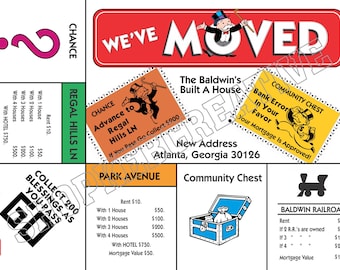Monopoly Card
Tokens are the playing pieces used in the Monopoly board game. They differ depending on the edition and the year of release of an edition. Standard editions, however different they are, usually use pewter tokens. In 1998, a new piece was voted on to be added to the existing 10 ( 11 in gold sets) The winner was a sack of money, which appeared in most standard editions until its retirement in. VINTAGE 1960s MONOPOLY BOARD GAME by Parker Brothers. Condition is 'Used'. All original pieces included (only missing St James Place card, but a replacement card made by me as a child is included, see photo). Game has been in my possession since childhood. Shipped with USPS Priority Mail.

monopoly
Monopoly Card List
$19.99
MSRP
products page urlMake this wildly different Monopoly game a favorite go-to game for game nights and other fun get-togethers. Lean into those iconic (yet unspoken) Monopoly moments in which rules are bent, money is borrowed, and funny business is welcomed. The outlandish suggestions on the board, cards, and rules encourage players to express their inner cheater to own it all while they buy, sell, dream, and scheme. Fake a die roll, steal some bills from the bank, and even skip out on rent. Complete a cheat to get a reward, but fail a cheat and pay the consequences! No houses in this edition 0013 only hotels 0013 and pretend handcuff unit may leave players 'chained' to the board.
• Includes gameboard, plastic handcuff unit, 6 tokens, 15 Cheat cards, 16 Title Deed cards, 16 Chance cards, 16 Community Chest cards, 16 hotels, 2 dice, money pack, bank tray, and game guide.
• Follow, bend, or break the rules to win in this edition of the Monopoly game
• Players can try to get away with as many cheats as possible
• Cheat cards tell players which cheats to attempt
• Plastic handcuff unit 'chains' cheating players to Jail space
• Ages 8 and up
• For 2 to 6 players.
Others Also Looked At
A Get Out of Jail Free card is an element of the board game Monopoly which has become a popular metaphor for something that will get one out of an undesired situation.[1]
Use in the game[edit]
The U.S. version of the board game Monopoly has two Get Out of Jail Free cards, with distinctive artwork. One, a 'Community Chest' card, depicts a winged version of the game's mascot, Mr. Monopoly, in his tuxedo as he flies out of an open birdcage. The other, a 'Chance' card, shows him booted out of a prison cell in a striped convict uniform.
Players move around the Monopoly board according to dice throws. Most of the tiles players land on are properties that can be bought. There is also a tile, the Jail, that can hold players and cause them to lose their turn until certain conditions are met. They can end up in this space by landing on the 'Go to Jail' tile, throwing three doubles in a row, or drawing a 'Go to Jail' card from Community Chest or Chance. The Get Out of Jail Free card frees the player from jail to continue playing and progress around the board without paying a fee, then must be returned to the respective deck upon playing it.
As the card's text says, it can also be sold by the possessing player to another player for a price that is 'agreeable by both'. Due to the fact that in the early game, one typically has all the funds necessary to get out of jail normally, and in the late game, the player typically wants to stay in jail to avoid landing on the spaces of the other players, the cards are typically only used as a massive financial asset.

In law[edit]
- In 1567, the prize in Britain's first lottery, commissioned by Queen Elizabeth I and Sir Frances Drake to raise funds for England's navy, included a kind of 'get out of jail free card' which the winner could use to excuse any but the most serious crimes.[2]
- In 1967, James Robert Ringrose, one of the FBI's Ten Most Wanted Fugitives, presented a Get Out of Jail Free card to FBI agents after he was arrested.[3]
- In the U.S. Supreme Court case Hudson v. Michigan (2006), the Court ruled that use of evidence against a defendant obtained through search warrants in instances that the police failed to knock-and-announce does not violate the Fourth Amendment of the United States Constitution. The majority opinion by Justice Scalia notes that suppressing evidence in such instances would amount 'in many cases to a get-out-of-jail-free card.'[4]
- The Patrolmen's Benevolent Association of the City of New York, a large NYPD union, gives out cards to officers to distribute to friends and family, giving them preferential treatment for minor offenses. The cards are commonly referred to as 'get out of jail free' cards, and are sometimes sold on eBay.[5][6]
See also[edit]
References[edit]
- ^Ritchie, L. David (2016). Metaphor. Cambridge University Press. p. 174. ISBN9781107022546.
- ^'The First National Lottery'. British Library. Archived from the original on 2016-01-21. Retrieved 7 December 2015.
- ^Dary Matera, FBI's Ten Most Wanted (NY, Harper Torch, 2003) page 43.
- ^Hudson v. Michigan (2006) 546 U.S. 586 at 595, 126 S.Ct. 2159 at 2166, 165 L.Ed.2d 56 at 67Archived 2017-09-21 at the Wayback Machine
- ^Kilgannon, Corey (11 January 2006). 'A Perk for Friends of the Police, Now on eBay'. New York Times. Archived from the original on 2018-01-31. Retrieved 2018-01-30.
- ^Balsamini, Dean (21 January 2018). 'Police union slashes number of 'get out of jail free cards' issued'. New York Post.